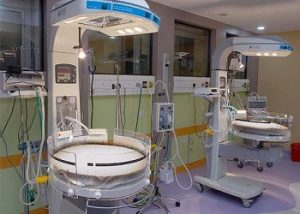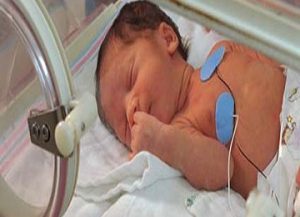Neonatal ICU(NICU)
Neonatal ICU in ghaziabad is available at Shreya Hospital in Ghaziabad. The Neonatal ICU is meant for the extra care of the new born baby. The birth of a baby is a wonderful yet very complex process. Many physical and emotional changes occur for mother and baby.
A baby must make many physical adjustments to life outside the mother’s body. Leaving the uterus means that a baby can no longer depend on the mother’s circulation and placenta for important physiologic functions.
Baby in a Neonatal Intensive Care Unit (NICU)
Before birth, breathing, eating, elimination of waste, and immunologic protection all came from the mother. When a baby enters the world, many body systems change dramatically from the way they functioned during fetal life:
- The lungs must breathe air.
- The cardiac and pulmonary circulation changes.
- The digestive system must begin to process food and excrete waste.
- The kidneys must begin working to balance fluids and chemicals in the body and excrete waste.
- The liver and immunologic systems must begin functioning independently.
Your baby’s body systems must work together in a new way. Sometimes, a baby has difficulty making the transition to the world. Being born prematurely, having a difficult delivery, or birth defects can make these changes more challenging. Fortunately for these babies, special newborn care is available.
The following are some factors that can place a baby at high risk and increase the chances of being admitted to the Neonatal Intensive Care Unit (Neonatal ICU). However, each baby must be evaluated individually to determine the need for admission. High-risk factors include the following:
Maternal factors:
-
- Age younger than 16 or older than 40 years
- Drug or alcohol exposure
- Diabetes
- Hypertension (high blood pressure)
- Bleeding
- Sexually transmitted diseases
- Multiple pregnancy (twins, triplets, or more)

- Too little or too much amniotic fluid
- Premature rupture of membranes (also called the amniotic sac or bag of waters)
Delivery factors for Neonatal ICU:
- Fetal distress/birth asphyxia (changes in organ systems due to lack of oxygen)
- Breech delivery presentation (buttocks delivered first) or other abnormal presentation
- Meconium (the baby’s first stool passed during pregnancy into the amniotic fluid)
- Nuchal cord (cord around the baby’s neck)
- Forceps or cesarean delivery
Baby factors for Neonatal ICU:
- Birth at gestational age less than 37 weeks or more than 42 weeks
- Birth weight less than 2,500 grams (5 pounds, 8 ounces) or over 4,000 grams (8 pounds, 13 ounces)
- Small for gestational age
- Medication or resuscitation in the delivery room
- Birth defects
- Respiratory distress including rapid breathing, grunting, or apnea (stopping breathing)
- Infection such as herpes, group B streptococcus, chlamydia
- Seizures
- Hypoglycemia (low blood sugar)
- Need for extra oxygen or monitoring, intravenous (IV) therapy, or medications
- Need for special treatment or procedures such as a blood transfusion


No Comments